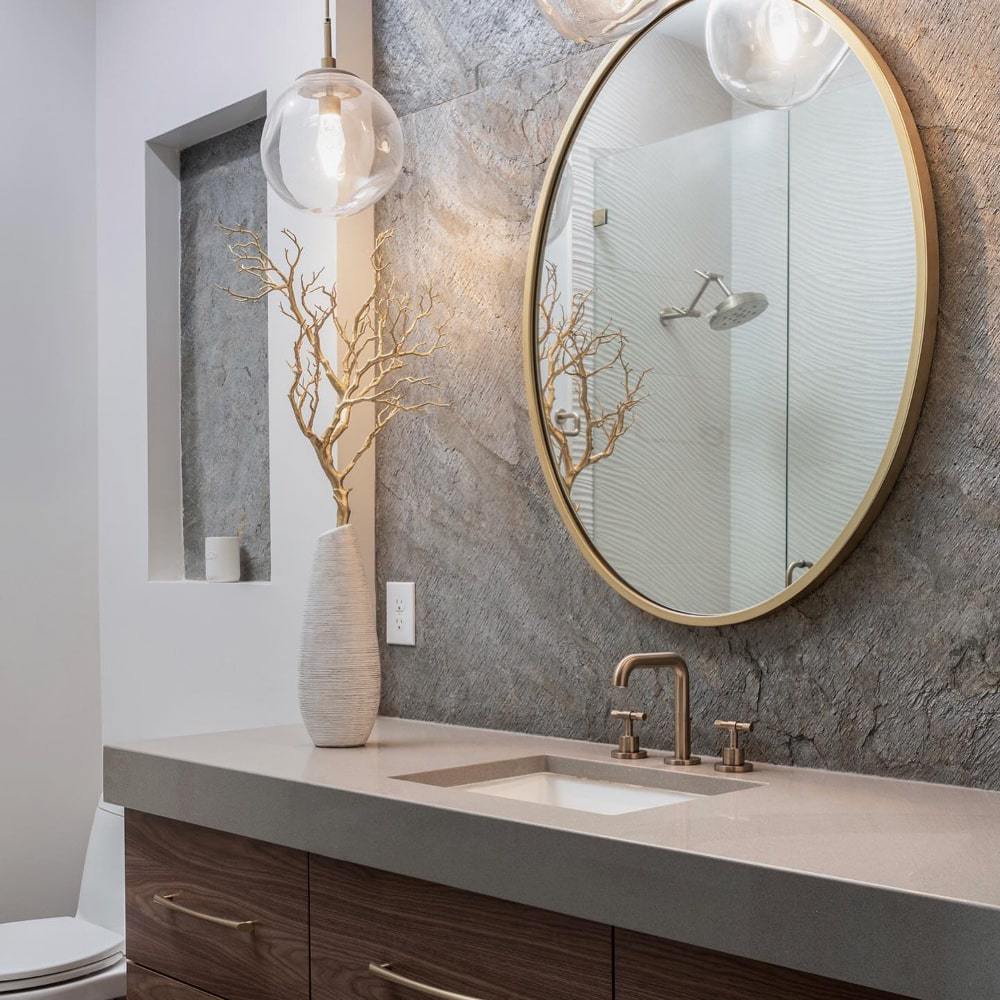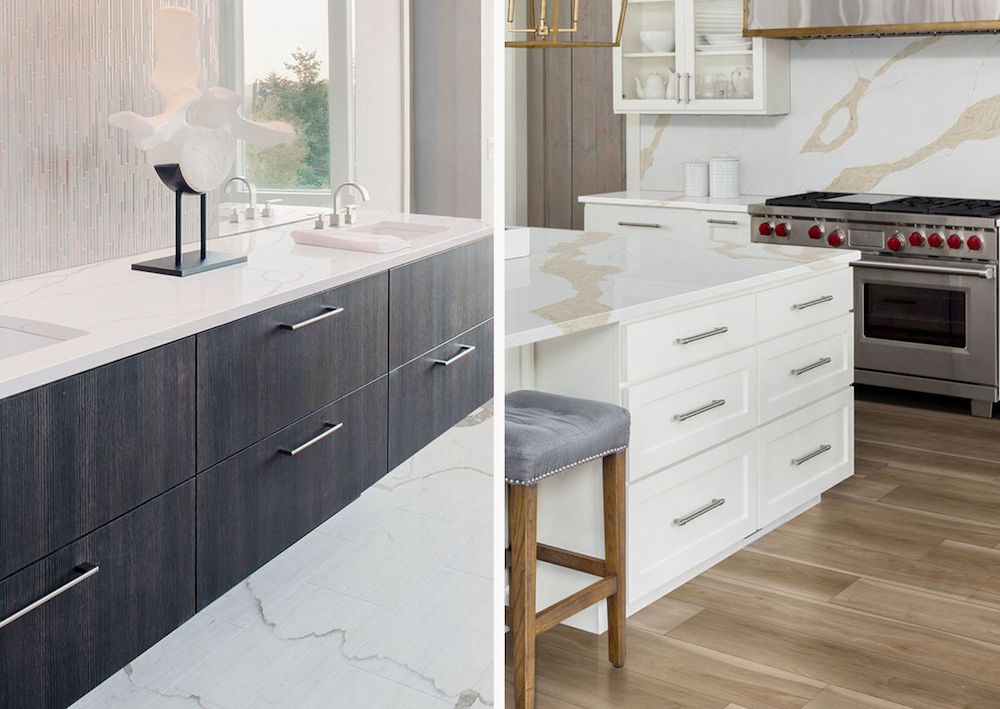The Do's And Don'ts Of Quartz Countertop Care
November 08, 2022Why Use Quartz Countertops
There are many different options for countertops today — even if you know you want one from the "natural stone" category. Whether you are looking for quartz countertops, concrete countertops, or manufactured laminate countertops, you will have to weigh the pros and cons of each option. So, how can you know which countertop option is right for you?
Countertop Materials
Countertops can be made from several materials — from natural stones to man-made composites. When looking for a new countertop, you will need to consider both your aesthetic preferences and the practicality of the material.
Some common countertop materials are ceramic tile, laminates, solid-surface, granite, quartz, marble, and concrete. One benefit of some types of countertops, such as quartz, is that they can have a variety of different appearances. For example, you can get a countertop made of quartz that looks like marble if you like the appearance of marble but do not want a marble countertop.
Advantages of Quartz
As mentioned above, quartz countertops are one of the many types of materials that you can use in your home. But, when looking for new countertops, you want to ensure that you opt for the best option. If this is the case, you will want to select quartz countertops since they have many advantages compared to other countertop materials.
Here are some of the most significant advantages of quartz countertops.
Durability of Quartz
Natural quartz is one of the hardest minerals found in nature. It falls at a seven (out of ten) on the Mohs Hardness Scale, which is used to help identify minerals. Now, while you likely will not be going around scratching all of the countertops to see how hard they are, a higher number on the Mohs scale directly correlates to how resistant to scratches the mineral is.
Marble, on the other hand, falls at a three on the Mohs scale and is very susceptible to scratching. For reference, your fingernail is a 2.5 on the scale.

Quartz is Non-Absorbent
Quartz countertops are naturally non-absorbent, unlike granite, marble, or concrete countertops. This makes them much less likely to stain and much easier to keep sanitized. In addition, the non-absorbent nature of quartz countertops makes them naturally resistant to bacteria and harmful microorganisms, which makes them a much safer option than a more porous countertop option — like concrete.
However, if you like the appearance of concrete but do not want to deal with the regular maintenance of sealing and polishing it, you can opt for concrete-looking quartz countertops. This is a great solution to get the appearance of concrete countertops without actually using concrete.
Quartz is Easy Maintenance
Another tremendous advantage of quartz countertops is that they are incredibly low-maintenance. While concrete, granite, and marble countertops need to be sealed and polished regularly to maintain a smooth and easy-to-clean surface, quartz countertops do not. Quartz is already non-porous and does not require sealing or polishing.
The surface can also be easily cleaned with warm water and a gentle sponge or cloth to minimize your need for harsh chemical cleaners in your home.
Customization Options
Unlike granite and marble countertops, which have limited appearance options, quartz countertops can come in many different colors and designs. You can explore many different quartz colors and design options that meet your personal aesthetic, such as warm quartz countertops.
Maintaining Your Quartz Countertops
Like any other type of surface, quartz countertops have specific care instructions you will want to follow to ensure that your countertops are correctly cared for and last a long time. Luckily, quartz care instructions are pretty simple, unlike many other countertop options.
Do's
Quartz Maintenance Tips
What should you do to keep your countertops well-maintained and beautiful for years?
Clean with a Soft Sponge or Dishcloth
Yep, that's it. You only need warm water and a dishcloth or soft sponge for routine cleaning of your quartz countertops. Simply wipe the counter clean, and you are good to go.
Use Gentle Cleaners
You may use a gentle liquid cleaner if you cannot remove all food residue or grease with water and a dishcloth. Some examples of appropriate cleaners are Mr. Clean, Simple Green, or your ordinary dishwashing detergent.
Clean Food Spills Promptly
While quartz countertops are stain-resistant and non-porous, it is usually best to still clean up any potentially staining spills quickly. Some particularly stain-prone foods and drinks are tea, coffee, wine, pomegranates, beets, turmeric, fruit juices, and food coloring. This is especially important if you have lighter or white quartz countertops, as any stains may be the most obvious on lighter colors.
Sanitize the Surface
The non-porous surface is more sanitary than other natural stone countertop options — like granite or marble — but it is still a good idea to sanitize your countertops routinely. You can use a 70% isopropyl alcohol cleaner or a Lysol disinfectant spray to sanitize your surfaces and eliminate any bacteria that may be living on the very surface of your quartz countertops.
Don'ts
Don't Damage Your Quartz
Here are some ways that you can damage your quartz countertops.
Place Hot Pans Directly on the Countertop
Like any other natural stone countertop, Quartz countertops may crack if exposed to enough thermal expansion energy. In other words, the sudden change in temperature from placing a hot pot directly on the countertop can shock it and lead to cracking. This said, quartz countertops are scorch-resistant, so you will not have to worry about any unwanted scorch marks on your countertops.
Cut Directly on the Countertop
The quartz countertop itself is scratch resistant, but due to the hardness of the surface, cutting directly on the counter may dull your knife.
Seal Your Countertop
Quartz countertops do not need to be sealed. Unlike granite, marble, or other porous natural materials, quartz is naturally non-porous. This means you do not have to seal, polish, or recondition your countertop when it is made of quartz.
Because quartz is naturally non-absorbent, sealers cannot penetrate the surface and simply sit on top of the countertop. This sealant layer will wear off unevenly and cause your countertops to appear inconsistently polished.
Use Abrasive Cleaning Agents
Abrasive cleaners can dull your quartz countertop's finish. If you need a more robust cleaner, you can use non-abrasive cleaning powders to clean the surface without affecting your countertop's finish.
Use Harsh Chemicals
Cleaning supplies that contain harsh chemicals — like bleach paint thinners and drain cleaners — or products with very high or very low PH levels can etch or discolor the surface of your countertops.
Conclusion
Whether you have just purchased some beautiful quartz countertops or are looking to replace your current ones with quartz ones, it is essential to know how to care for them properly. Hopefully, these tips will help keep your countertops looking beautiful for years to come.
If you are looking for new countertops for your kitchen, bathroom, or any other part of your home, check out MSI's Premium Natural Quartz to find your perfect countertop.
Learn More About Quartz Countertops
Get Inspired With 10 Quartz Countertop Ideas
7 Kitchens With Glamorous Cabinetry & Quartz Countertop Pairings
6 Stunning New Quartz Countertop Colors To Satisfy Any Space
MSI's Top 10 Lumaluxe Quartz Countertop Colors
5 Beautiful Bathrooms With Quartz Countertops

